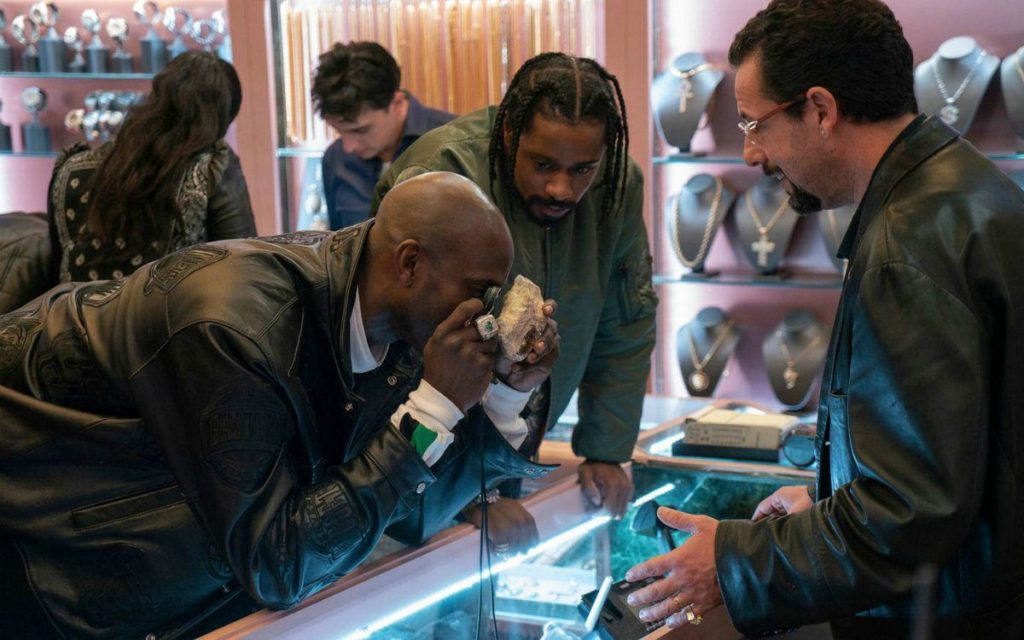The Safdie brother’s “Uncut Gems” is fast-paced, anxious…a panic attack. We follow Howard (Adam Sandler), a jeweler and gambling addict, as he tries to pay off his gambling debts, ironically using the money he earns from placing precarious bets. Howard’s addiction stems so deep within him that despite anything he does, he always comes back to it. His decisions haunt him, maybe not consciously enough, but certainly externally. We watch as he pays his dues, attempting to fix the bridges he has burnt.
This is not a tale of warning, neither is it a fairy tale. Even though it’s fictional, it remains a reality, a compelling one. At the heart of it are the imperfect characters that engage us. Howard may have an annoying presence at times, but each decision he makes keeps us guessing.
Adam Sandler’s performance is seamless as usual. He embodies Howard so succinctly, rising to each challenge accordingly. He balances elements of comedy and drama, doing the dramedy justice. In the past, Sandler has been victim to a lot of crass comedies, and although they have been entertaining, they have become gimmicky. Such comedies have stagnated to the point where we know what to expect from Sandler. The gold is in his more serious performances, where we don’t know what to expect.
Sandler portrays Howard with conviction yet complete passion for what he does as a sneaky gambler, eating into his jeweler day job. It isn’t exactly the addiction that is worth noting here, although it is excruciating and even nauseating to watch (it’s a lot of money!). It is Sandler’s light-hearted approach to Howard that makes him stand out in contrast to the rest of the characters in the film.
Sandler’s work in “Uncut Gems”still remains somewhat inferior to his work on Mike Binder’s “Reign Over Me” (2007) and Paul Thomas Anderson’s “Punch-Drunk Love” (2002). His attention to detail as an actor is evident here, everything down to his movements has been carefully studied, drawing us into his character to the point where we feel his pain and joy. Likewise, character study is Sandler’s strength, and this is evident in the vast majority of his work, including comedies. In “Uncut Gems” he takes a similar approach, building a wholesome character too. This comparison has its limits as the characters are complete opposites, but what remains is the depth and how it resonates. In “Uncut Gems” Howard does not transform, whereas in “Reign Over Me” and “Punch-Drunk Love,” Sandler’s character transforms. He is underrated as a serious actor, when in reality he pretty much masters the craft. He builds wholesome characters and can transform them. “Uncut Gems” lacks in this, falling flat. Very flat.

The Safdie brothers are able to capture NYC in such an intricate and expressive way, their previous “Good Time” (2017) and “Heaven Knows What” (2014) show this. In the same vein, “Uncut Gems” (2019) is different from these. The brothers’ style and approach remain bold and fresh, but in “Uncut Gems” this has been taken to a new level. Perhaps this is due to their departure from their previous cinematographer to a new one, Darius Khondji. There is a sense of synchronicity, from the visuals to the characters and the visual attention to detail. The neon NYC lights compliment the dazzling jewels in Howard’s store alongside the celestial black opal, which is recurring throughout the film. Everything you see contributes to something greater. It feels like an extended “Curb Your Enthusiasm” episode but dark and violent, repackaged into a different genre. The formatting and part of the vibe that “Uncut Gems” gives off is generally a bit Martin Scorsese-esque, most of all in its concrete jungle landscapes and quirky secondary characters. Whether this is intentional or not, Scorsese is the executive producer.
There is not a moment throughout the film that is stagnant, it is a speedy run against time, a man against the world and against his lurking fate. This is gripping in that, we are invested in this story from beginning to end through each fast-paced shot and moment. We fear for Howard; but likewise, we admire his fearlessness which at the same time is his fault. The black opal may be part of his success, but it is also part of his downfall. The film’s opening helps facilitate this by showing us the discovery of the black opal and then a colonoscopy of Howard’s colon, each transitioning into the other seamlessly. This is a deep-rooted metaphor for Howard and the direction the film takes in terms of this troubled character, although the direction doesn’t go as far as we would hope in the long run. The film ends and you’re left thinking ‘is that it?’
There is a David Cronenberg influence present in the Safdie’s filmography that is interesting. Much like in his films such as “The Fly” (1986) and “Videodrome” (1983) that are part of a genre of ‘body,’ where it’s not the reaction but the action that drives the film. “Uncut Gems” specifically showcases this in that the black opal is part of Howard’s body. Not literally, but metaphorically.
Sandler’s portrayal of Howard is strong. We can’t deny he’s an incredible actor, hence why “Uncut Gems” feels underwhelming, especially when considering all the hype Sandler’s performance has gained. He has other work worth celebrating first, this is limited, and I don’t understand why as an actor he doesn’t go for more ambitious roles more often. His transformations on screen set a high standard. That’s not to say “Uncut Gems” loses value. It’s a cinematic masterpiece, especially visually. There is so much to appreciate, and it leaves us wanting more from these young filmmakers. Their catalogue of work may not be super extensive, but it is certainly that of auteurs and has authorship. What they bring to the screen is new, original, and refreshing. They’re a duo to look out for.